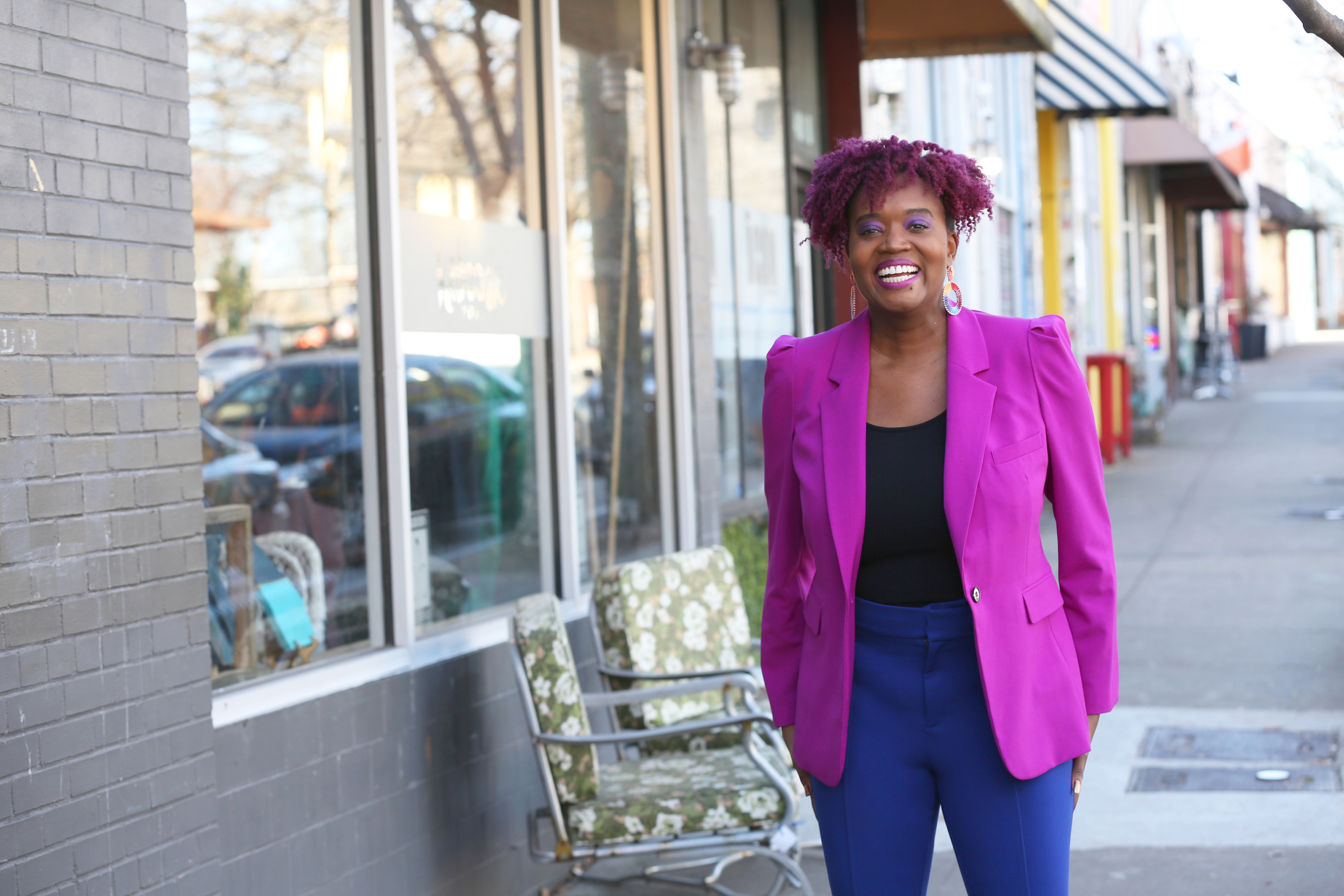
At 22, Amena Brown thought her dreams were over. She'd just been rejected from every graduate school she'd applied to—NYU, University of Pittsburgh, Georgia State—all turning down her MFA applications in poetry. The very art form that would later become her full-time career for over two decades wasn't deemed worthy of academic validation.
"I got no feedback," Amena recalls of those rejections. "I feel like part of it was I've just never been an academic writer." What felt like a devastating end was actually a divine setup for a beginning that no classroom could have provided.
Today, Amena often commands five-figure speaking fees as a poet, author, and comedic storyteller. Her journey from Smoothie King employee to sought-after creative professional is a masterclass in turning rejection into redirection—and building sustainable creative freedom without sacrificing your soul.
The Question That Changed Everything
Amena's path towards her creative career began with a single conversation during her freshman year at Spelman College. Initially a psychology major planning to become a preacher, she was having a routine check-in call with her mentor's husband when he posed a question that would reshape her entire trajectory.
"He was like, 'Let me ask you a question: If you were so wealthy that you did not have to go to college to get a job, would you still go to college?'" Amena remembers. "And I said, ‘Absolutely. So that I could write about it.’"
The response surprised even her. "Before I could think of the thing I should say, I just said it," she recalls. When he pressed further about what her post-graduation life would look like, she painted a vivid picture. "I would travel the country, and I would do speaking engagements and book signings,” she shares with pride. “I told him that at 18."
His response back was simple yet game-changing: "That doesn't sound like a psych major. That sounds like an English major."
Within two months, Amena had changed her major, setting in motion a career that would eventually fulfill that exact vision—just not in the way she initially imagined.

When Rejection Becomes Redirection
After graduating from Spelman, those grad school rejections felt like the end of the road. "I was heartbroken," Amena admits. "Because I honestly think that felt like safety - that buys me three years to figure out what's next."
Instead, she found herself working at a smoothie shop, watching people's kids come in with their parents' credit cards and feeling angry about her circumstances. But sometimes the detour is the destination.
Just months later, while still working at Smoothie King, Amena got her first professional gig—a speaking engagement that emerged from her involvement in campus ministry. That single performance led to a phone call the next morning notifying her that hundreds of people were asking about her work, wanting to know if she had a book or if the poem she performed was available somewhere.
"I had no idea that [would be] the beginning of what was going to be my poetry career," she reflects. Within two years, she was traveling the country performing at events for thousands of people.
Only months after her grad school rejections, huge faith-based organizations were now paying Amena well to perform the “free verse" poetry academic institutions couldn't understand. "They denied me to get a degree," she says with a laugh, "The very thing that I've had a career in for over 20 years."
The Soul Work vs. The Paycheck
Amena's journey wasn't without its challenges. Even as her speaking career flourished, she eventually took a corporate job writing for internal publications. The steady paycheck and benefits seemed like the responsible choice.
Six months in, she knew it wasn’t for her.
The breaking point came when her manager criticized her for asking too many questions about an article she'd been assigned—questions that revealed uncomfortable truths about the company's policies. "Writing is my soul work," Amena explains. "So they were asking me to turn my soul off, and I don't write like that."
After two years, she quit that corporate role without a backup plan, just as the 2008 economic downturn hit. "Quitting your job at the end of 2007, right before the downturn in 2008, meant all the churches were going to start holding real tight to their purse strings," she recalls. "So all the gigs I was thinking I was going to get, they were not coming."
What followed was a humbling year of customer service work, credit card debt, and questioning whether her dreams were still realistic. But even in that valley, her next upswing was around the corner.

Learning the Business of Being Creative
Amena's next breakthrough came in 2009 at a Christian leadership conference in Atlanta. Her performance to a full 13,000-seat arena resonated so deeply that people stuffed business cards into her small notepad afterward.
"I got so many requests to do gigs after that, that I had to quit my customer service job," she says. By 2010, she was back to working full-time as a creative.
But this time around, success meant learning the business side of her creative career—something that hadn't been modeled for her. "Toni Morrison, Alice Walker, Nikki Giovanni, Sonia Sanchez, those were the only Black women writers I knew," she explains. "And those models felt far. Make it big or be crushed."
She had to learn to distinguish between different types of work and price accordingly. "You're making custom work versus if somebody booked me to do [work] I'd already written," she notes. Commission work, she discovered, required premium pricing because it’s typically unusable afterwards, due to its specificity.
Travel gigs meant understanding opportunity cost. "If you're asking me to fly to Dallas, I can't also take a gig in Cleveland the same day that I'm in Dallas,” she explains. “So now I have to charge a premium to cover for the time I can't do any other work."
The Power of Pivoting
Maybe most importantly, Amena learned that pivoting isn't failure—it's evolution. After 13 years in the Christian market, she made another major transition expanding beyond church audiences.
"The other thing I would tell her is don't be afraid to pivot," she says, speaking to her younger self. "A big pivot came to me in my late 30s, and I didn't know I could have a whole new career in my late 30s."
Part of that transition involved reconciling her authentic voice with market expectations. "Some of it was me having to discover what I believe spiritually. What do I value spiritually?" she explains. "Originally I was in agreement. The values were aligned, but then they weren't."
Now, Amena continues to perform, lead creativity workshops, and serve as chapter host of CreativeMornings/Atlanta. She’s also in the creative process of her forthcoming book of comedic essays, Never Tell a Black Girl How to Black Girl.

Advice for Your Journey
For creative professionals navigating their own paths, here are a few practical tips Amena offers.
Build your runway first: “If you work a full-time job, don't quit it until you've saved up at least six months to a year of living expenses plus additional cushion.”
Don't put all your eggs in one market: “Even when one area of your business is thriving, always be open to something else.”
Remember that momentum takes time: “Six months to a year is momentum building - getting to know what you do, getting planted in circles, and meeting people.”
Know your worth: “Just start increasing your rates, because after a while, you say $10,000 and they don't blink. So if they didn't blink, then it could have been $15,000 or $20,000.”
The Bigger Picture
Amena’s journey from smoothie shop employee to commanding five-figure speaking fees is about more than building an independent creative career—it’s also about staying open to life’s redirections and staying true to your authentic voice. In a world that often asks creatives to choose between artistic integrity and financial stability, Amena proved you can honor your soul work and build a sustainable career, too.
So, let her story be a reminder. Sometimes the doors that close aren't meant to keep you out—they're meant to redirect you toward something better than you ever imagined.
-
Want more stories that move your soul and your soles? Subscribe below to our newsletter for weekly inspiration, practical guidance, and more stories of creatives building their career and lives on their own terms. Join our community of 1000+ artists and creative entrepreneurs charting their own paths to success.



